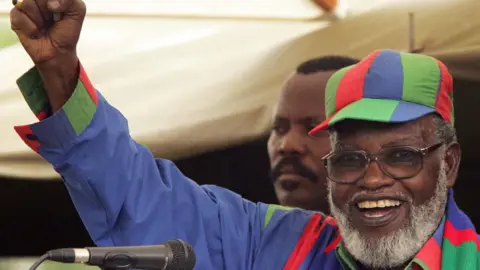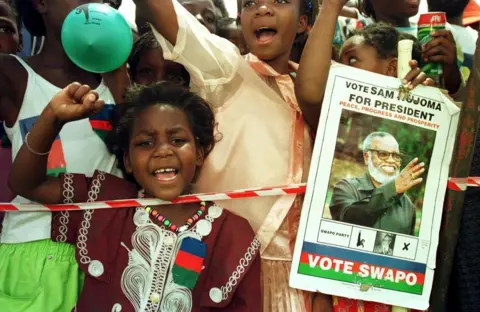Physical Address
304 North Cardinal St.
Dorchester Center, MA 02124
Physical Address
304 North Cardinal St.
Dorchester Center, MA 02124

BBC News
 AFP
AFPAs the “Father of the Nation” and as an icon of the liberation of Namibia, Sam Nujoma achieved these expectations in several ways.
His warm, wide smile and easy way made it favorable and accessible.
Regardless of making a career to join a fun running on Windhoek’s Independence Avenue, or insist on your driver returning from official motor cubes, trying to be a man of people.
Now, four decades after Namibia was led by a bitter guerrilla war in South Fricika’s racist apartheid government and independence, Nujoma died. 95Or
He died on Saturday after the “bad health” was hospitalized for three weeks due to Nangolo Mbumba president announced in a statementand added that death “shook” the country.
The giant shaping the national identity of Namibia can only leave a few to fill it.
Namibia, formerly called Southwestly -Furic, suffered decades of looting and colonial violence in the hands of Europeans who entered the country in the 20th century.
From 1904, German colonists killed tens of thousands of namibi named the world “Forgotten genocide”– German officers used black African people as a guinea pig for terrible crimes that the Nazis later repeated during the Holocaust.
Namibia was under German occupation from 1884 to 1915, when Germany lost its colony in the First World War.
Namibia then fell under the rule of White South, which extended its racist laws to the country, denying any political rights of black Namibias and limiting social and economic freedoms.
The introduction of overwhelming apartheid legislation led to the disintegration of guerrilla independence in 1966.
At this stage, Nujoma has already been involved in the fight against the White Rules.
The peasant family from the northern village of Etunda had a modest start in the life of the “elder” son of the “peasant family”, with just over elementary education.
He married Kovambo Theopoldine Katjimune, with whom he had four children and worked on a railway, had a deep passion for politics and wanted to save his men from injustice and unworthiness of colonization.
The inspiration was created in the stories of early Namibian resistance leaders, such as Hendrik Witboooi, who fought against the Germans in the 1880s.
By 1959, Nujoma became the leader of the Owamboland popular organization, the Swapo Forerunner was the independence movement.
A year later, at the age of 30, Nujoma was forced into exile. Without a passport with his caval – Ending in Zambia and Tanzania before leaving for West -Fricika.
With the help of the Liberian authorities, who were early supporters of black Namibian independence, Nujoma flew to New York and filed a petition to the UN to help Namibia independence -but South -Ffrika denied it.
White leaders of South Africa have the “Marxist terrorist” for the leading forces that fought for the anti-Apartheid movement in several South African countries.
With the support of Cuban troops fighting in the neighboring Angola, Swapo guerrillas were able to attack the South African bases in Namibia.
Returning from the exile, Nujoma -Ta South -Tafrician authorities quickly destroyed it and deported to Zambia six years later.
“We knew that only the military power and the mass political mobilization supported by the support of the people would force South Frica from Namibia,” he said in Nujoma’s autobiography, where others fluctuated, published in 2001.
He led Swapo forces from exile before returning to the country in 1989, one year after South Ffrica agreed to Namibian independence.
South -Ffrika has become increasingly isolated and the costs of military intervention have increased. After almost 25 years of warfare, Namibia finally acquired independence.
In Namibia’s first democratic elections in 1990, Swapo won a huge majority and Nujoma became the first president of the country.
Nujoma, in particular, dealt with the situation of children and introduced maintenance payments that were obliged to contribute to the cost of increasing the offspring.
He also supported women’s development, helping to change the traditional patriarchal practices that forced the widows from the family home after their husband died.
It seemed to continue to preserve stability to ensure the development efforts were supported by international donors.
Nujoma was re -elected for two more sections in 1994 and 1999 -when it was criticized that the constitution had changed to be in the third period.
 AFP
AFPWhen he criticized his government style or asked his party’s political past, the broad smile could become sour. Pointing his finger to someone who is openly daring or criticizing, he sometimes loses his face and violates insults.
He openly disgusted the same -sex relationships, but never went to change the constitution or the law to make them illegal.
Nujoma always appreciated his close friendship with Zimbabwe Robert Mugabe, but as president of Namibia, he mostly kept open aggression against those who disagreed with him.
However, with Swapo machines, it would be very happy to put pressure on the ordinary person to attract the party line and allow the party to be immersed in the government fund to ensure continuous rule.
Nujoma’s cabinet was often dictated, instead of making decisions on the basis of a common debate, which was his power.
When he resigned as his president in 2005 and, in 2007, SWAPO, after serving as a party leader for 47 years, gave power to his successor, Hifikepunye Pohahaba.
Even after leaving ex officio, Nujoma gave significant power over the party and the government behind the scenes.
Nevertheless, his results during his office are undeniable, and many Namibi praised him to lead the country to a smooth transition to democratic rule.
Since independence, Namibia has been considered one of Africa’s success stories with regular peaceful and democratic elections.
And, despite the humiliations and injustices of white colonists, Nujoma maintained the country’s constitution to protect all the fundamental rights of Namibia, any kind or color.
The policy of national reconciliation has encouraged the white community of the country to survive and continue to play a major role in farming and other economic sectors.
Nujoma’s ability to combine a nation of three million people – in 10 ethnic and linguistic communities – has gained many miracles.
In recognition of the results of the tower, the Namibian Parliament gave him the official status of his “founder’s father” in 2005. Numerous international honors are the Lenin Peace Prize, the Indira Gandhi Peace Prize and the Ho Chi Minh Peace Prize.
In recent years, Nujoma has disappeared from the spotlight, but rather spending time with her big family.
He remembers his light charm and unequivocal conviction – his father not only for a family, but to a whole nation.
More reports: Natasha booty
 Getty Images/BBC
Getty Images/BBC